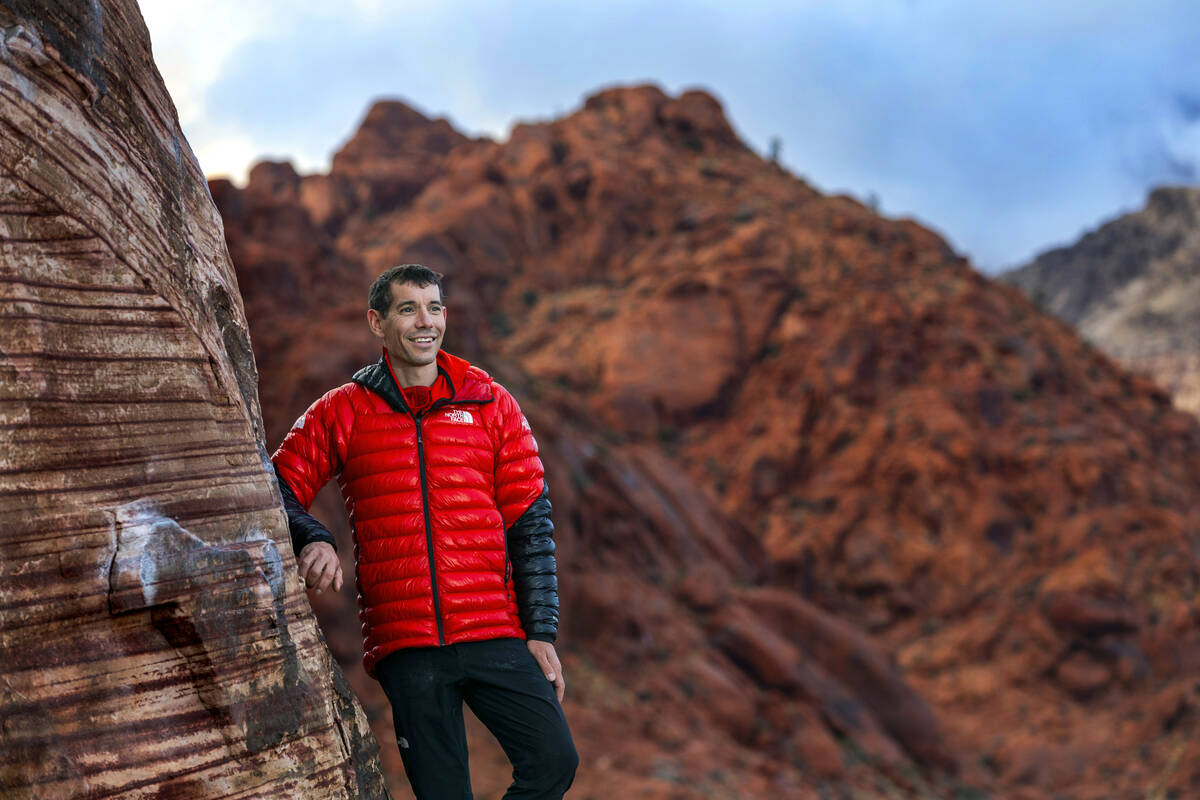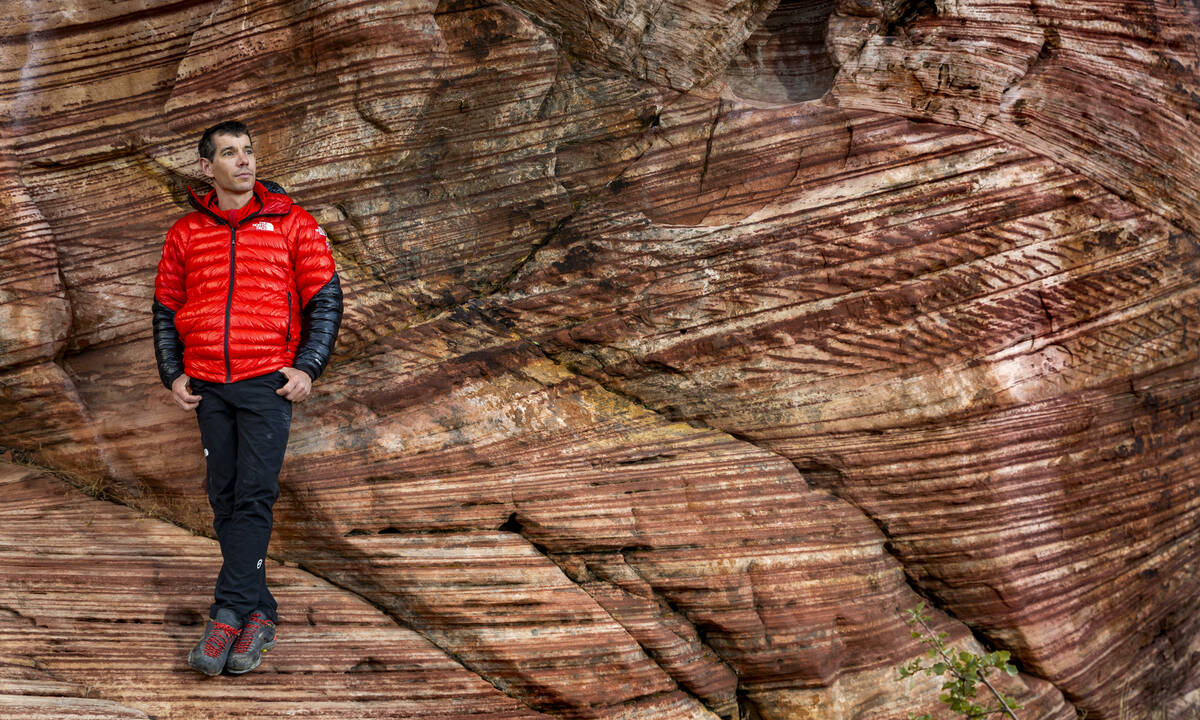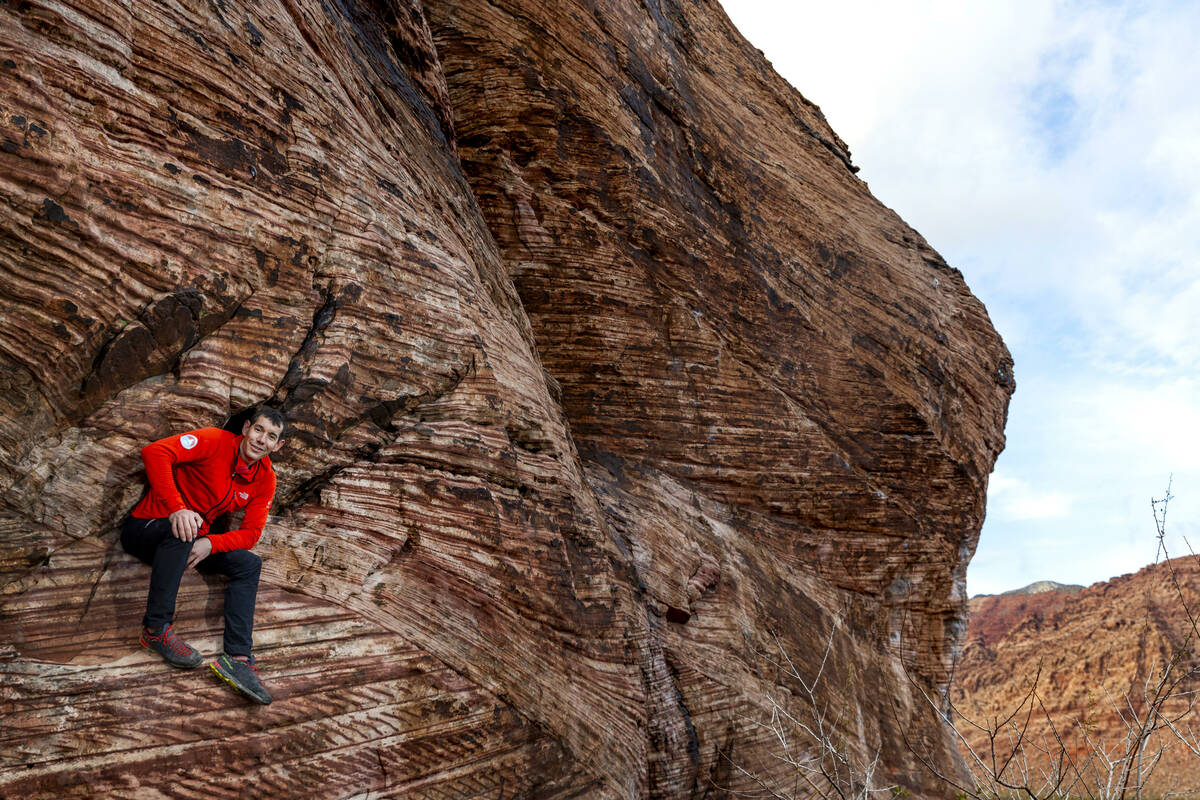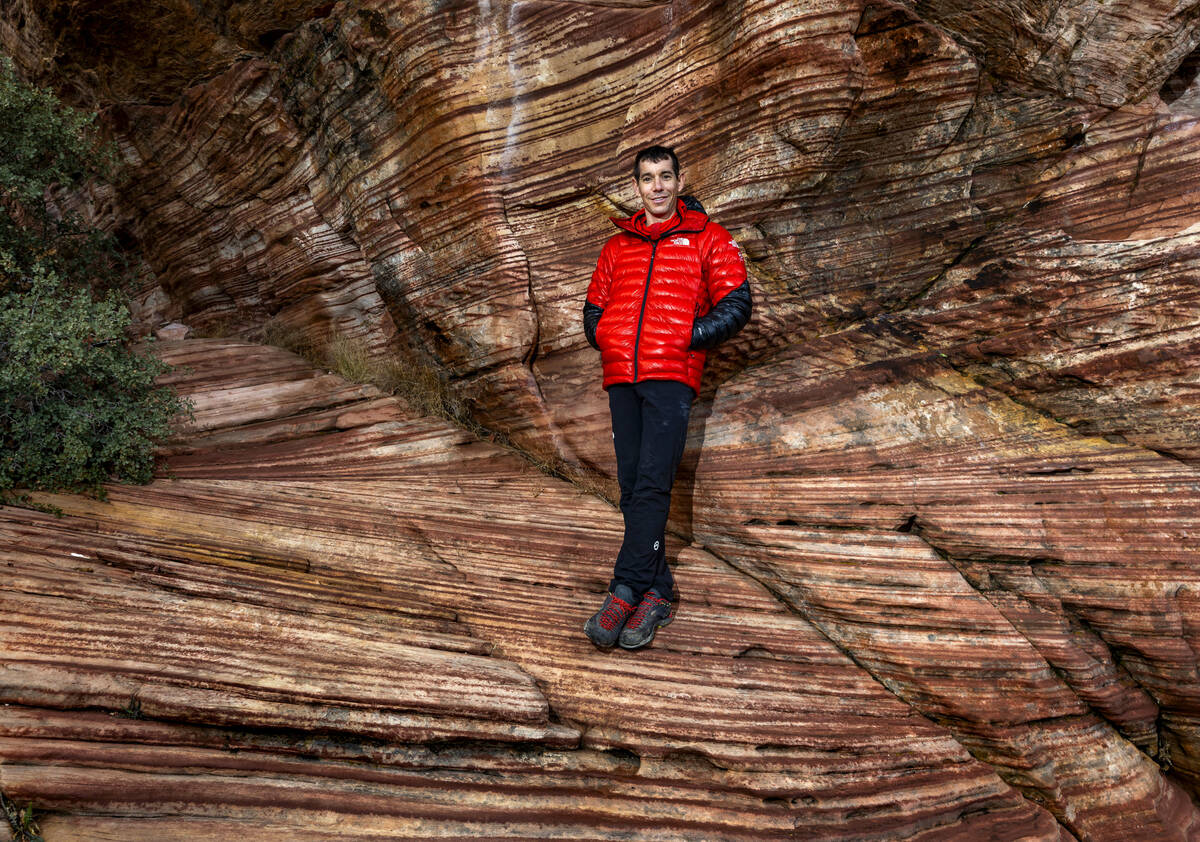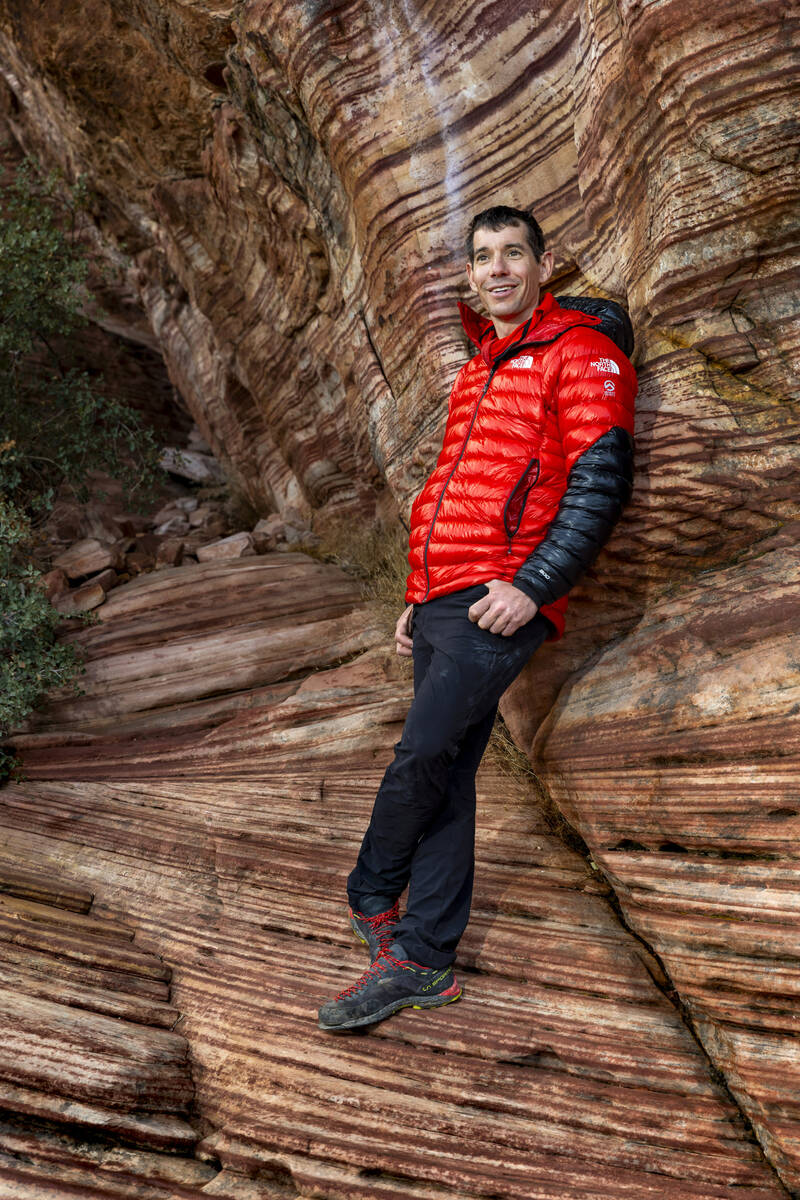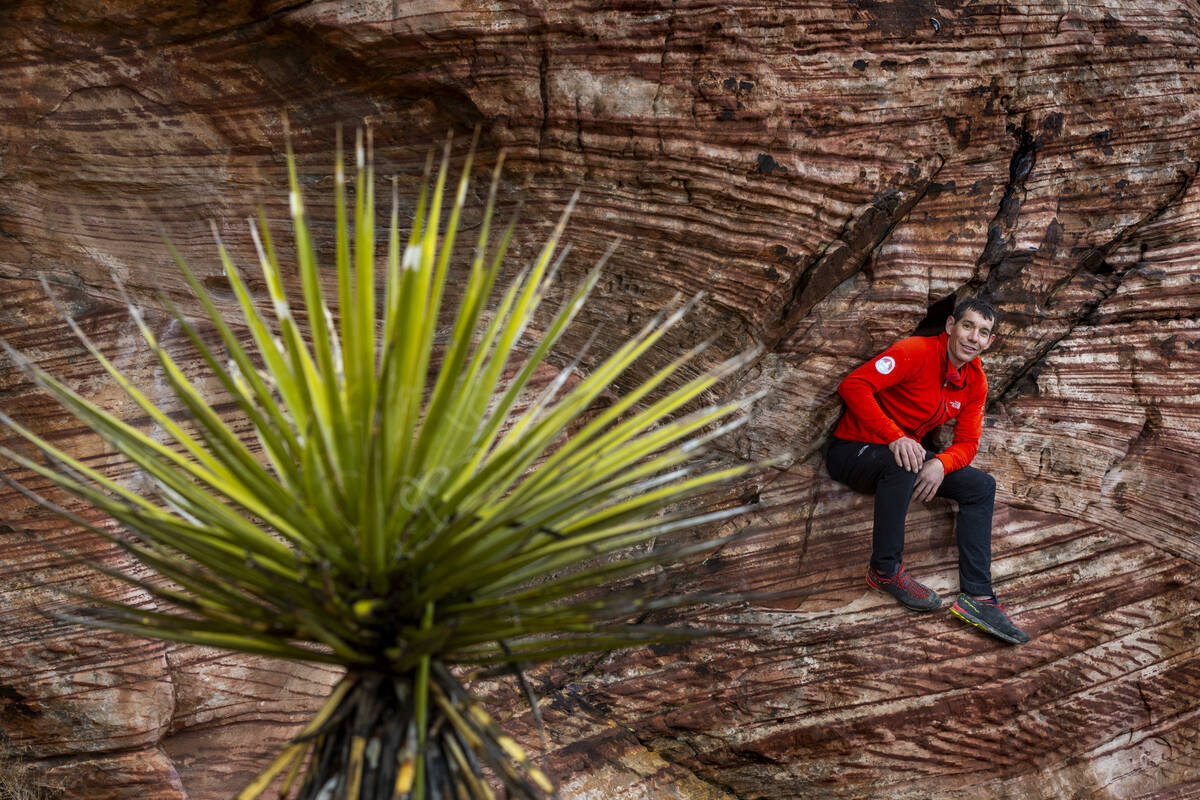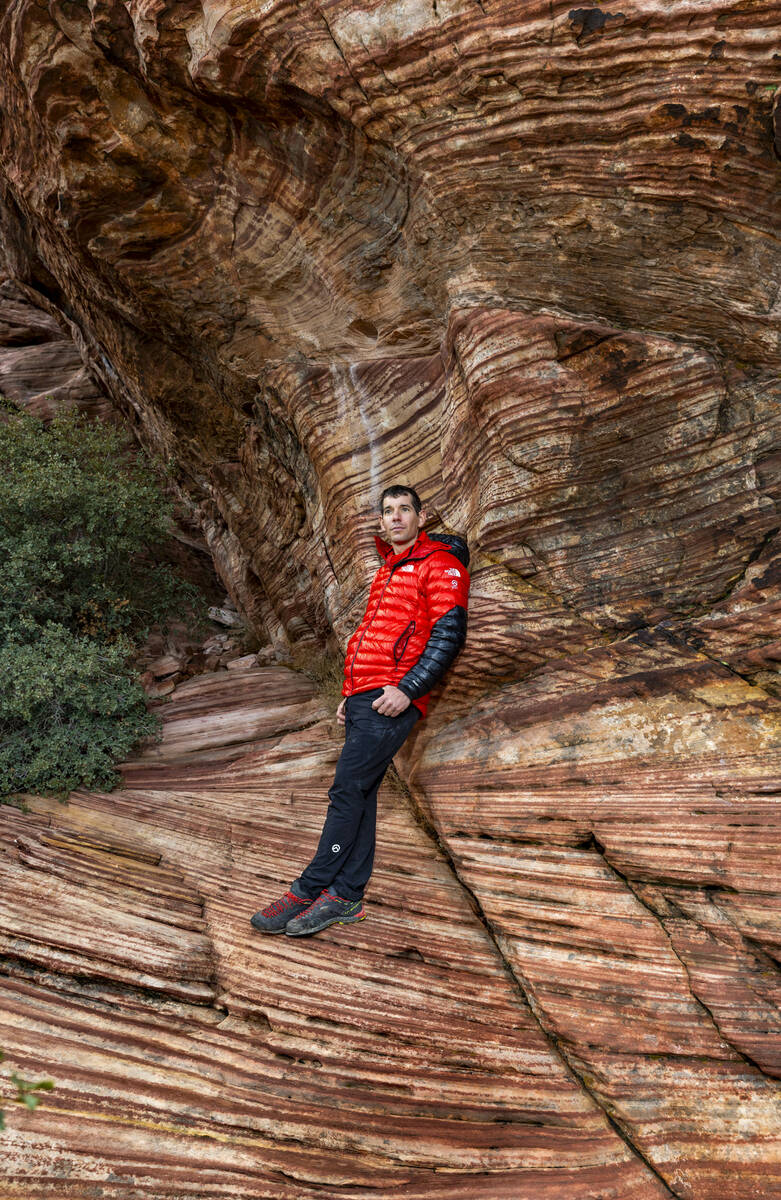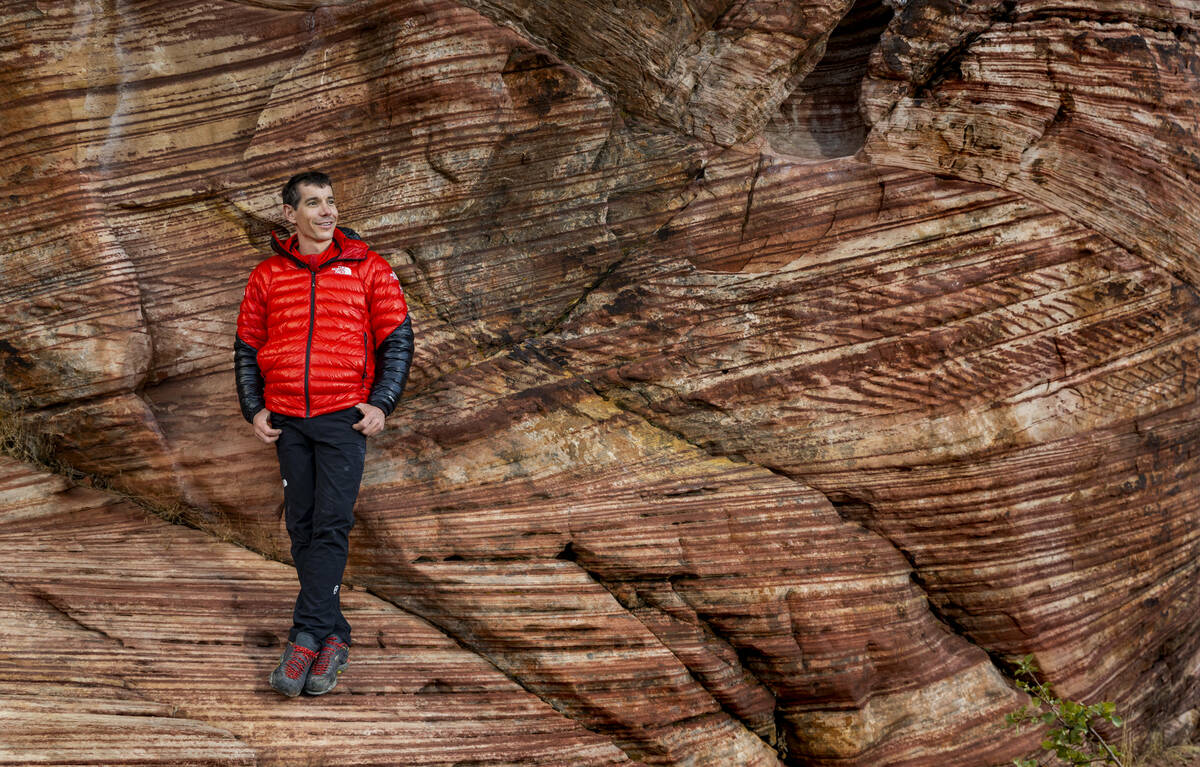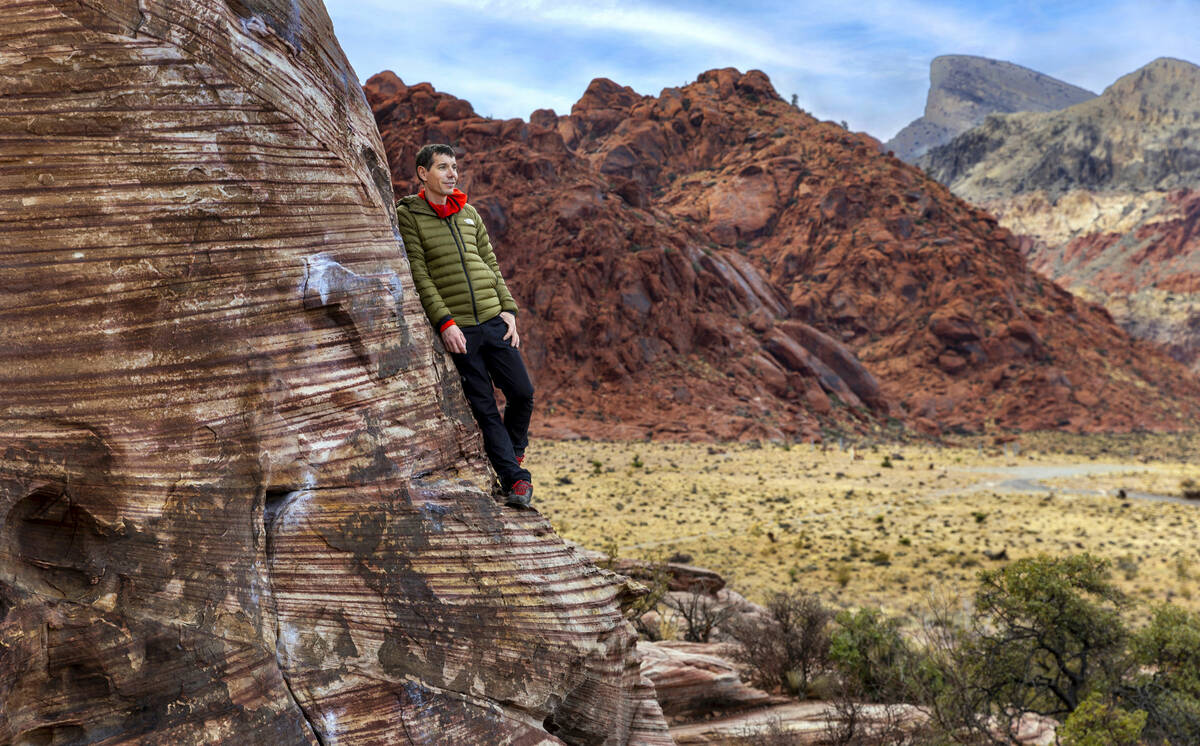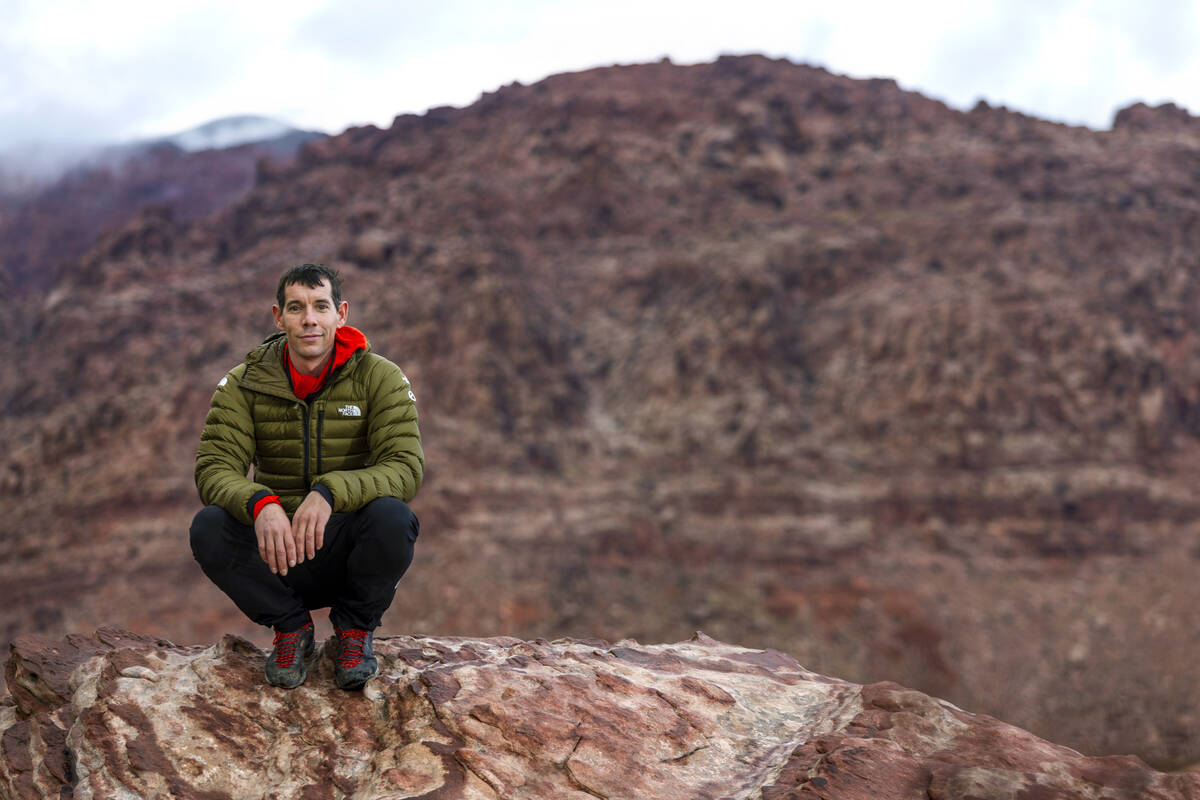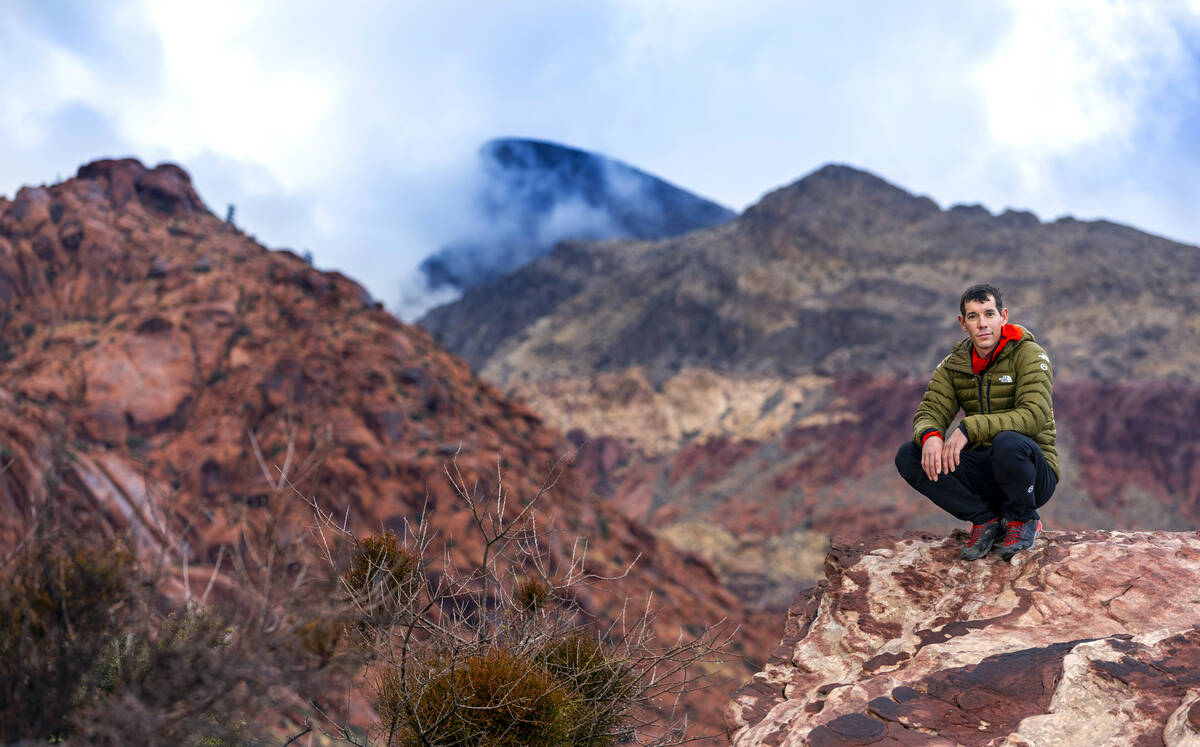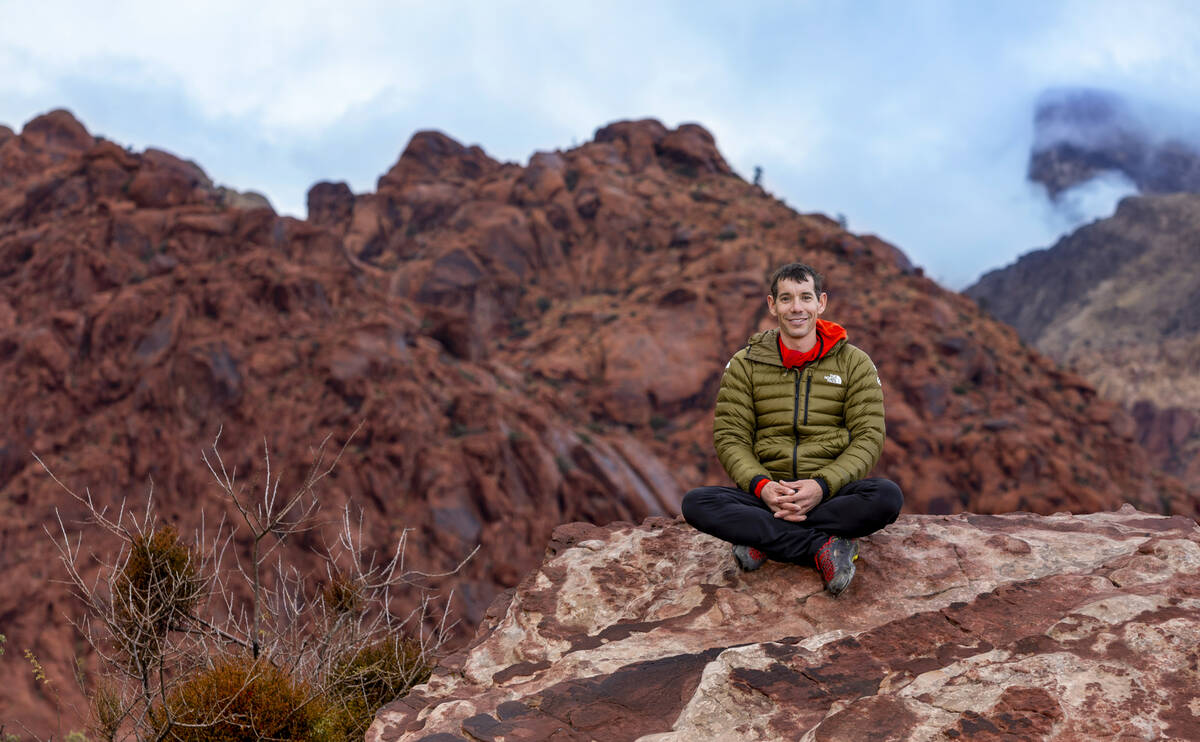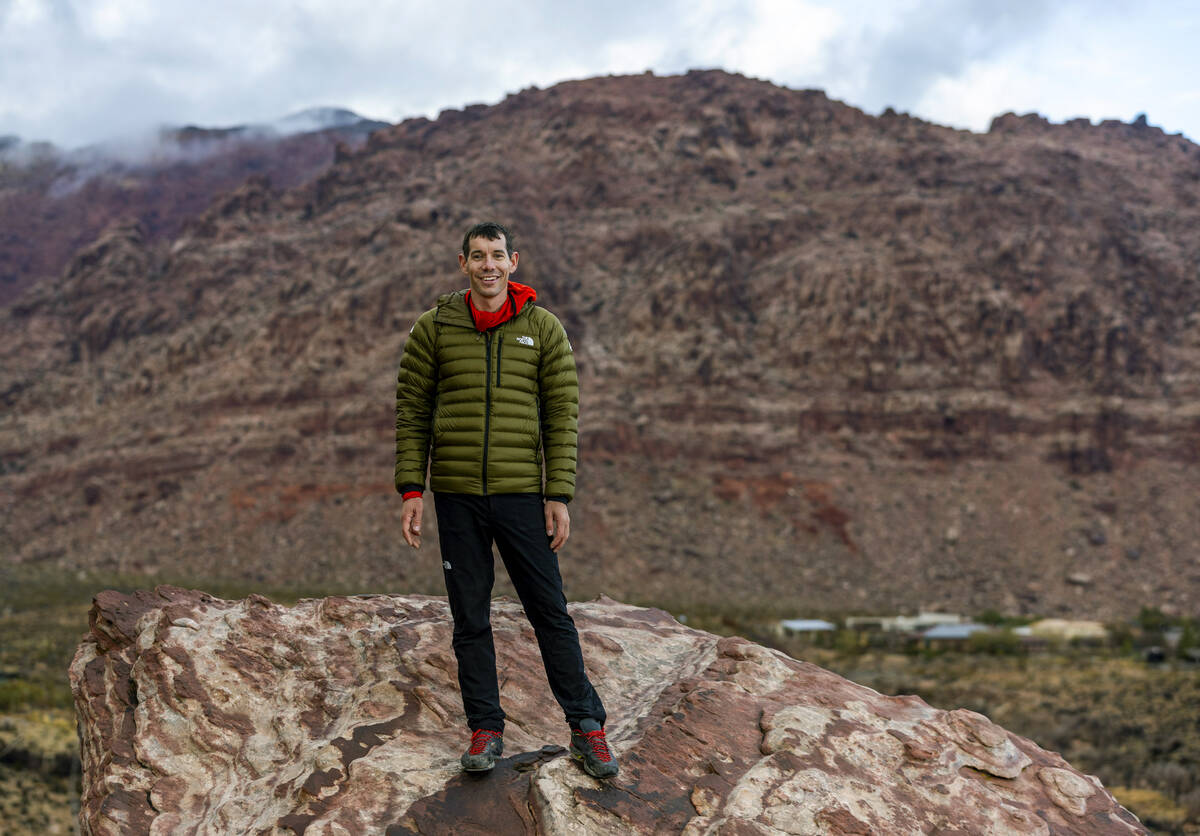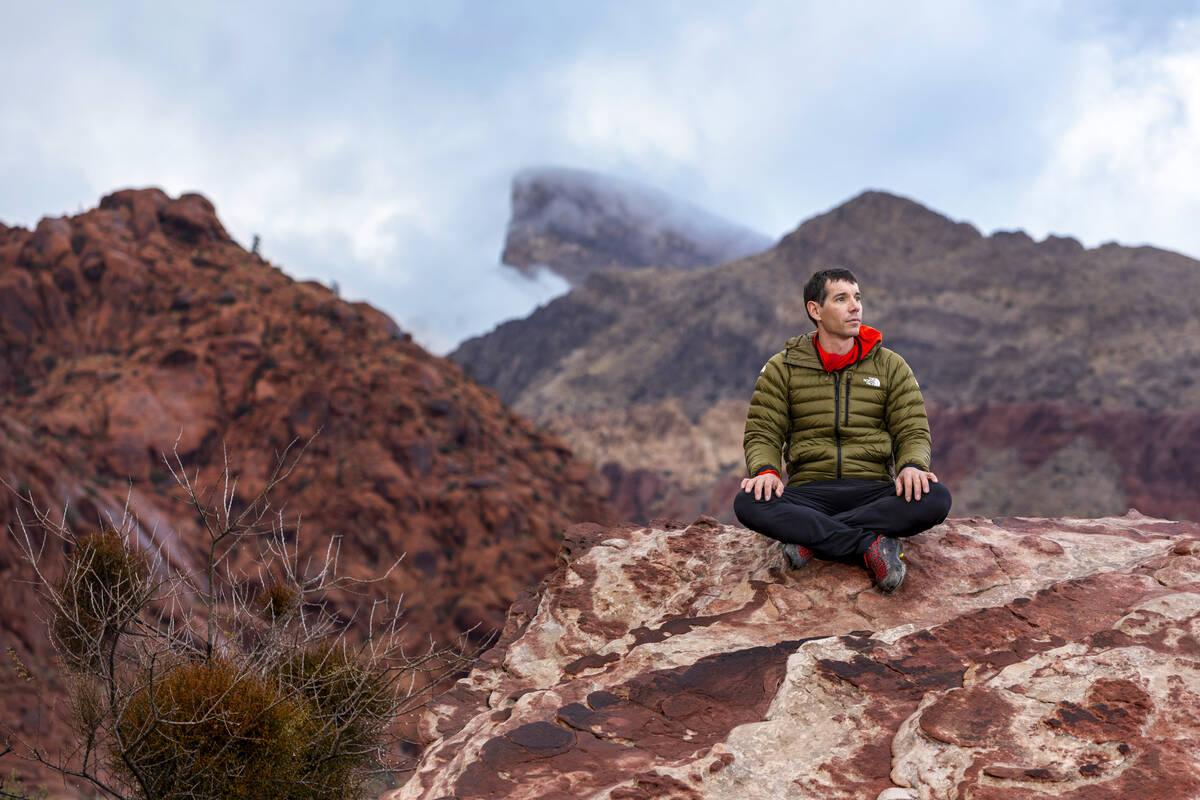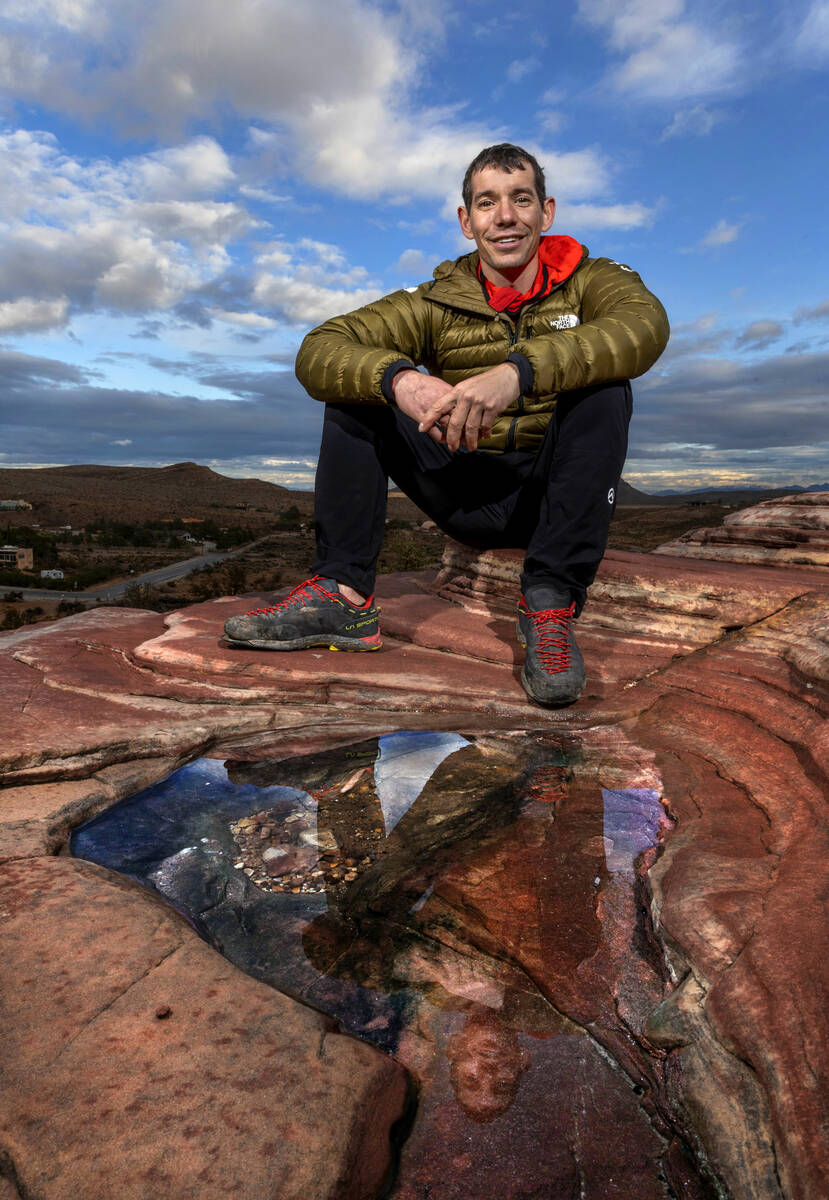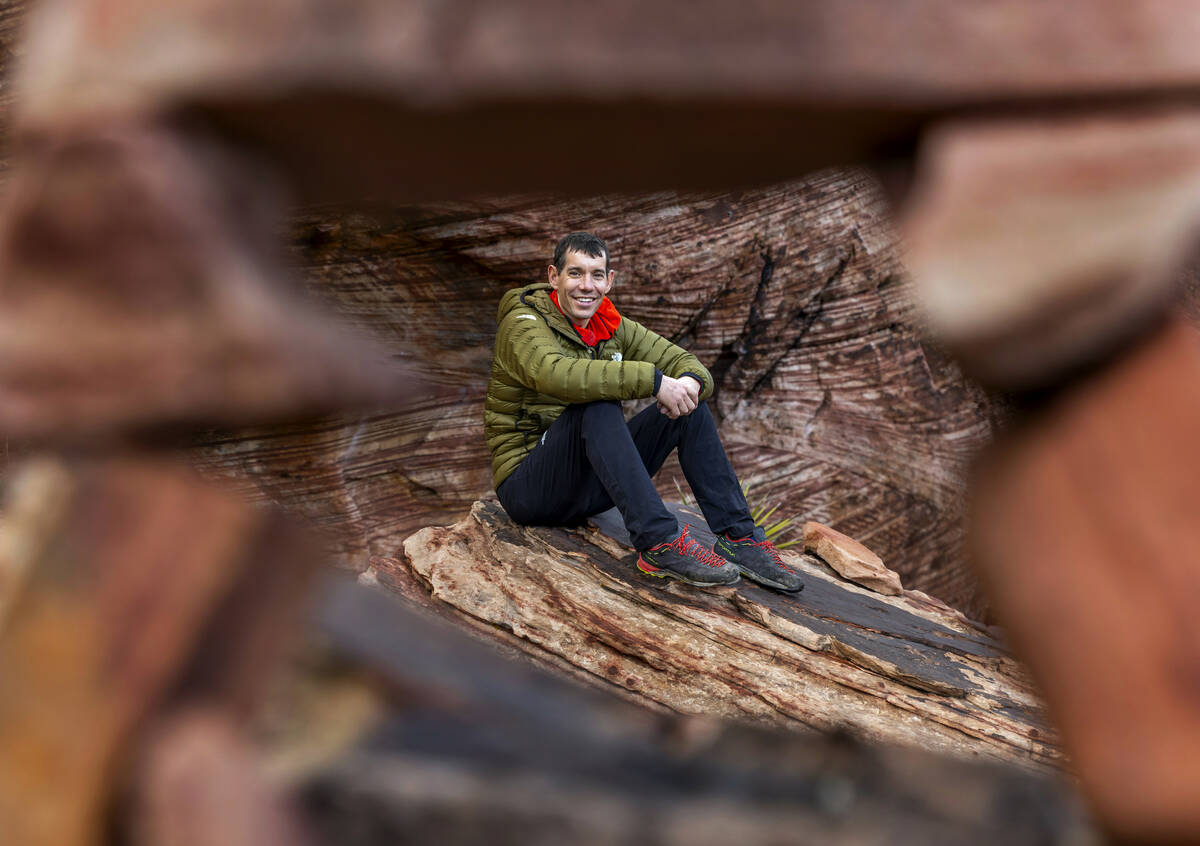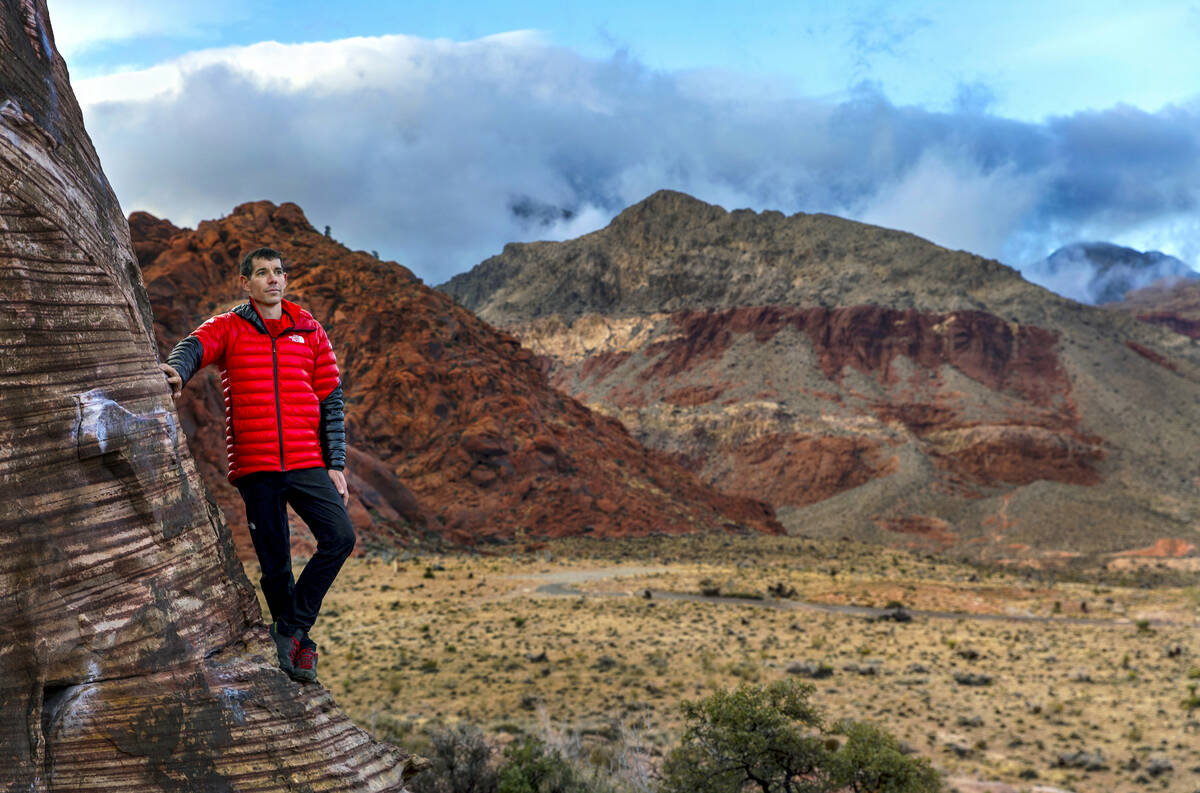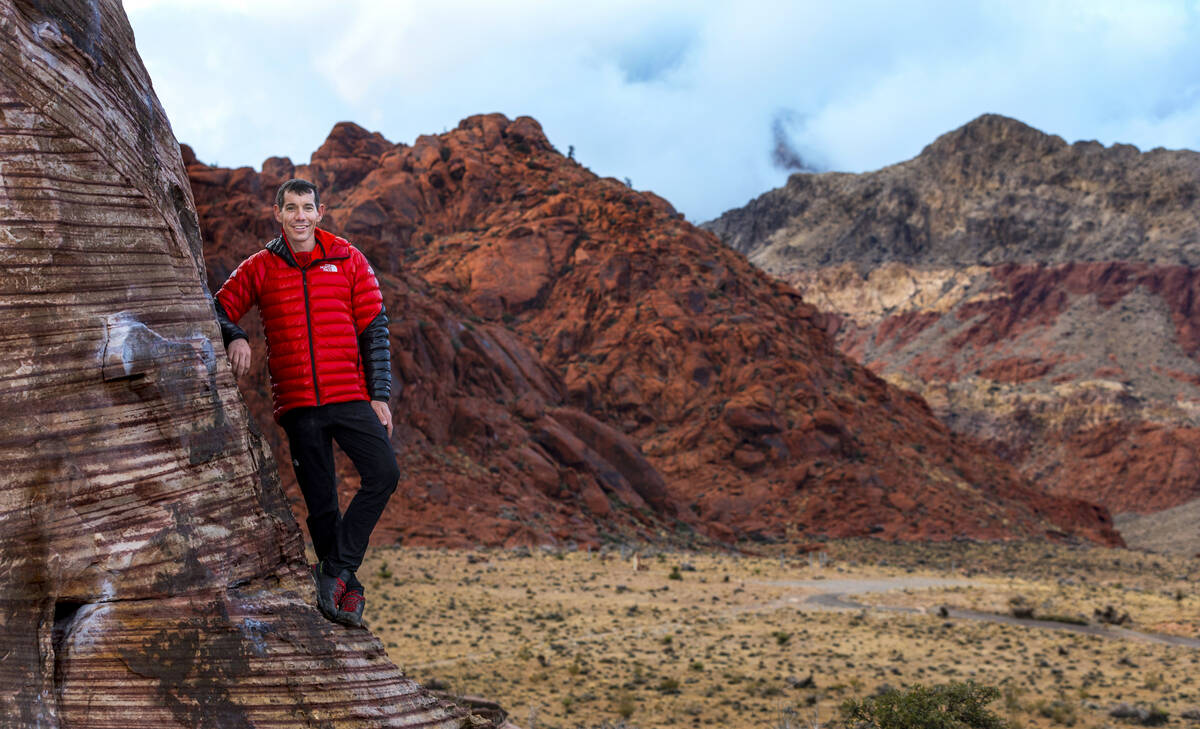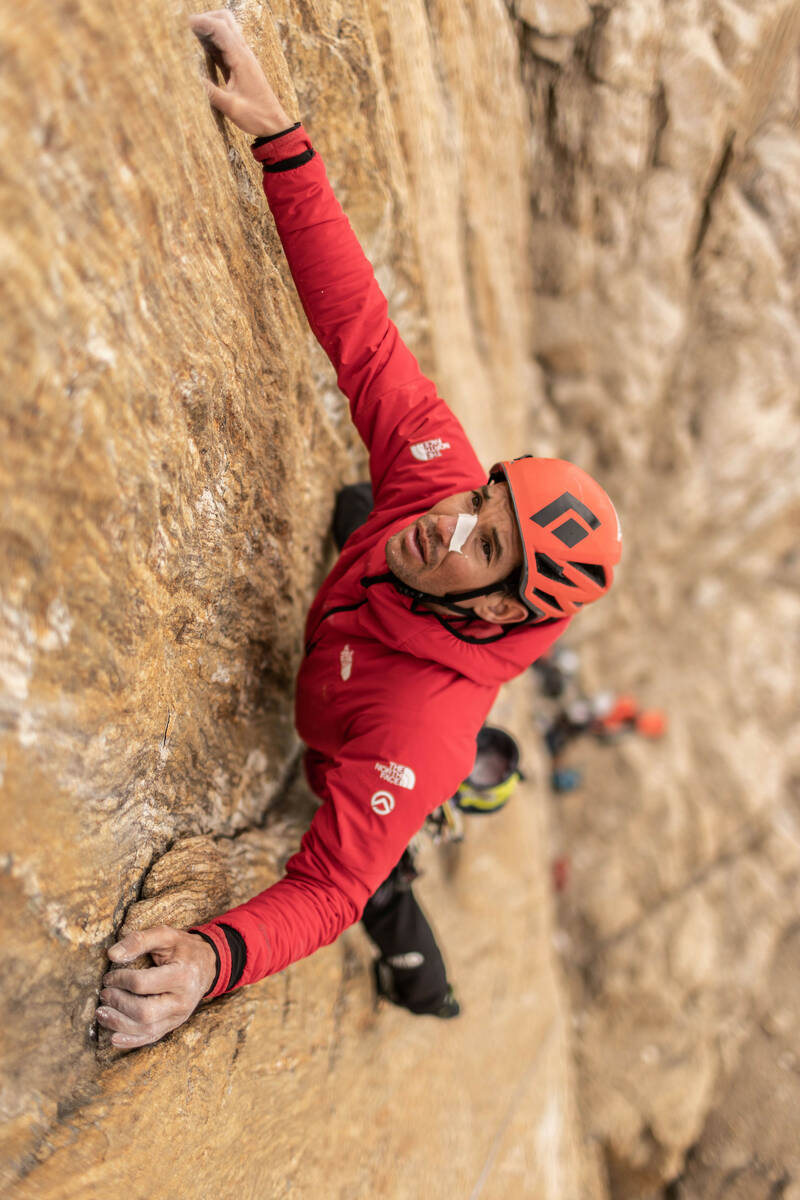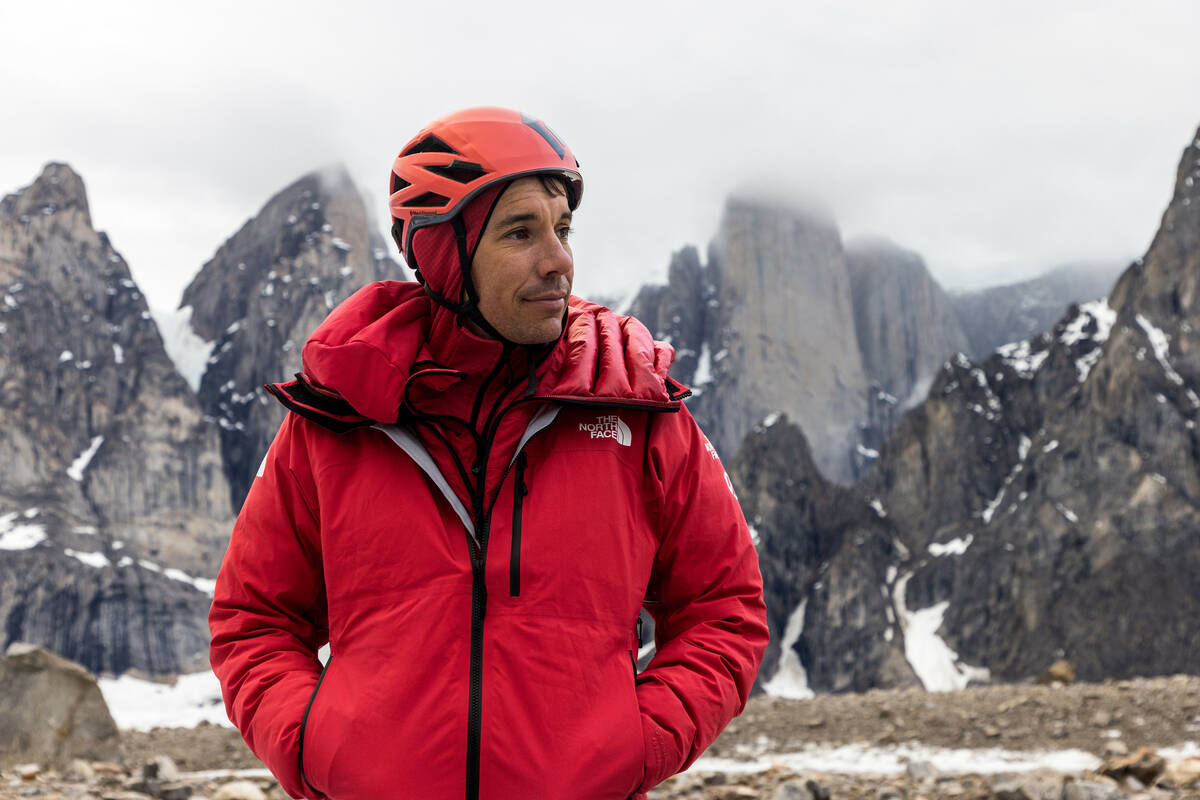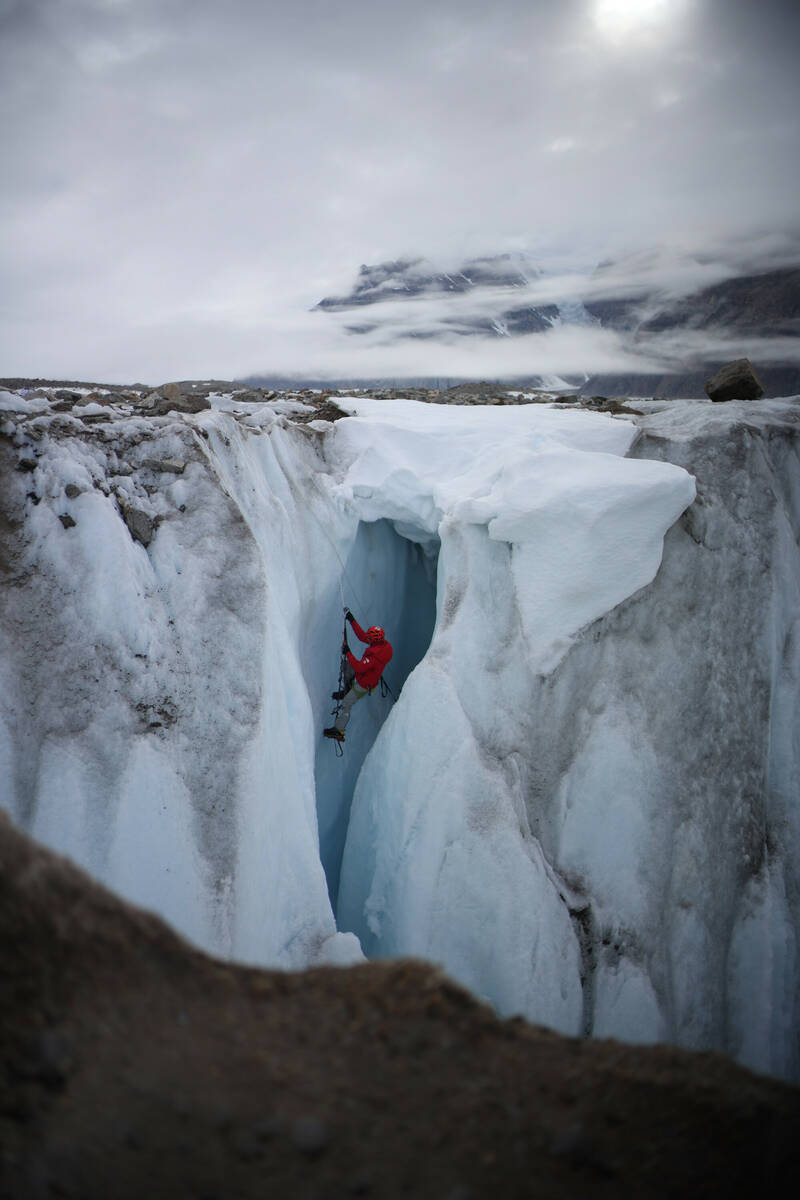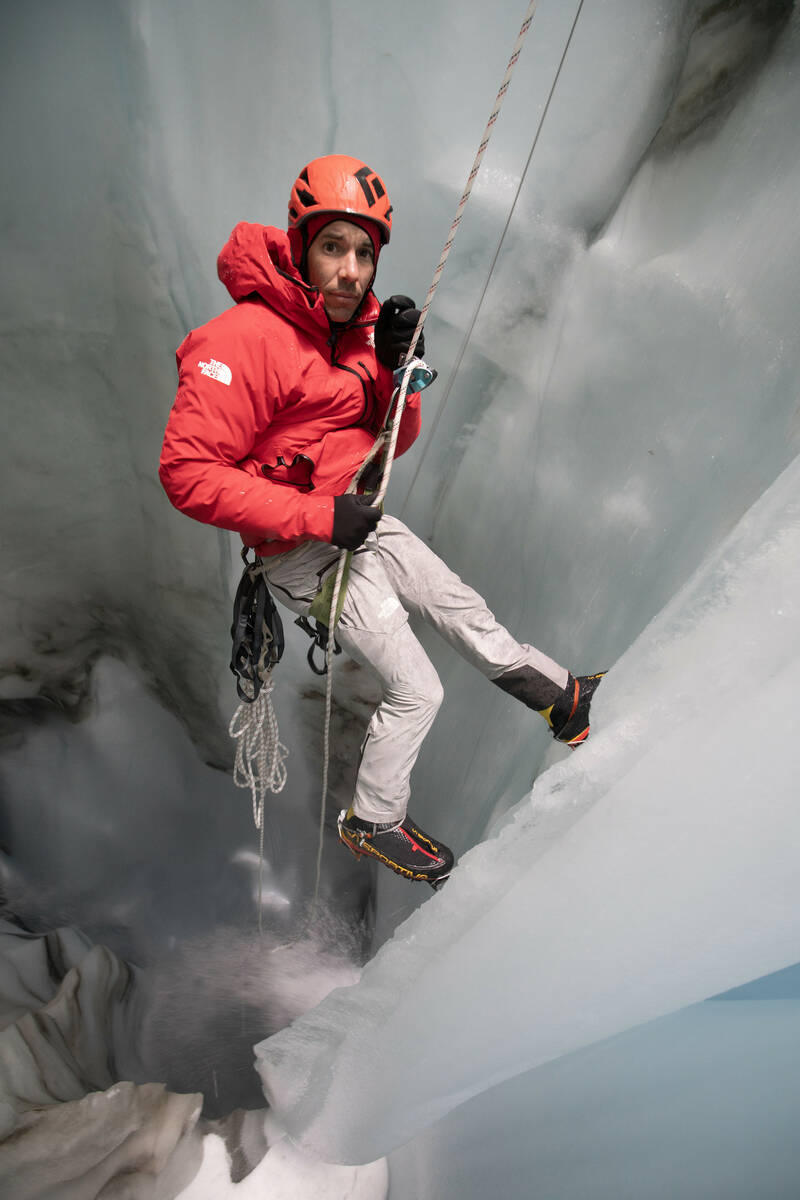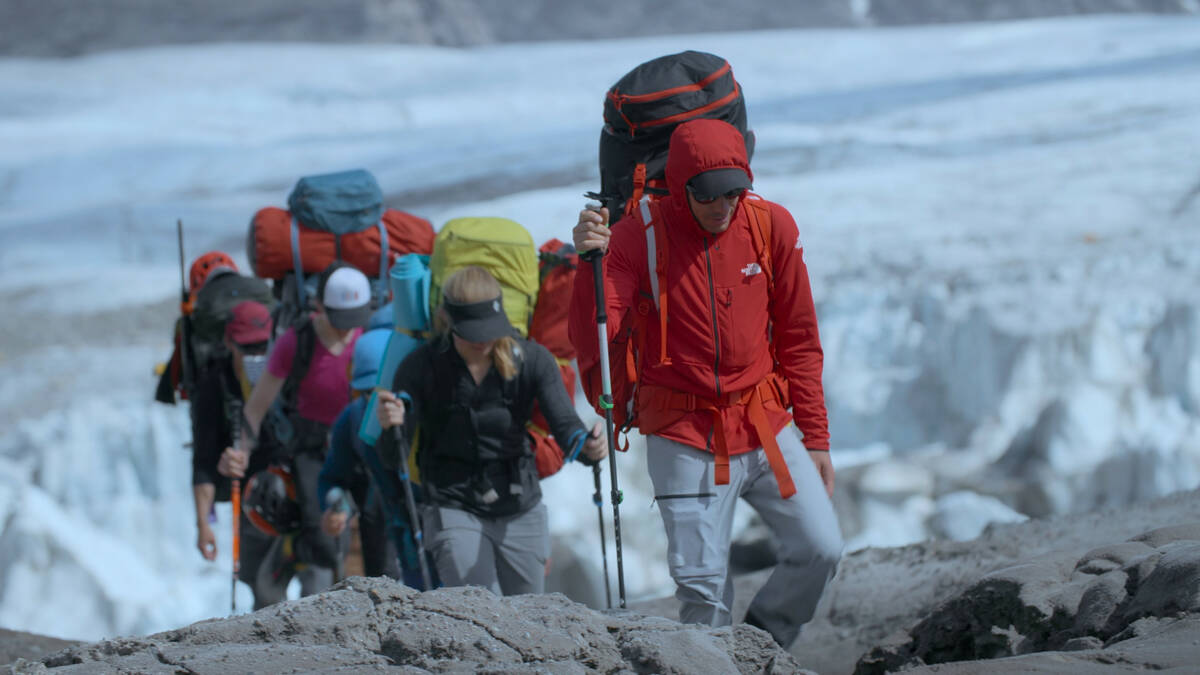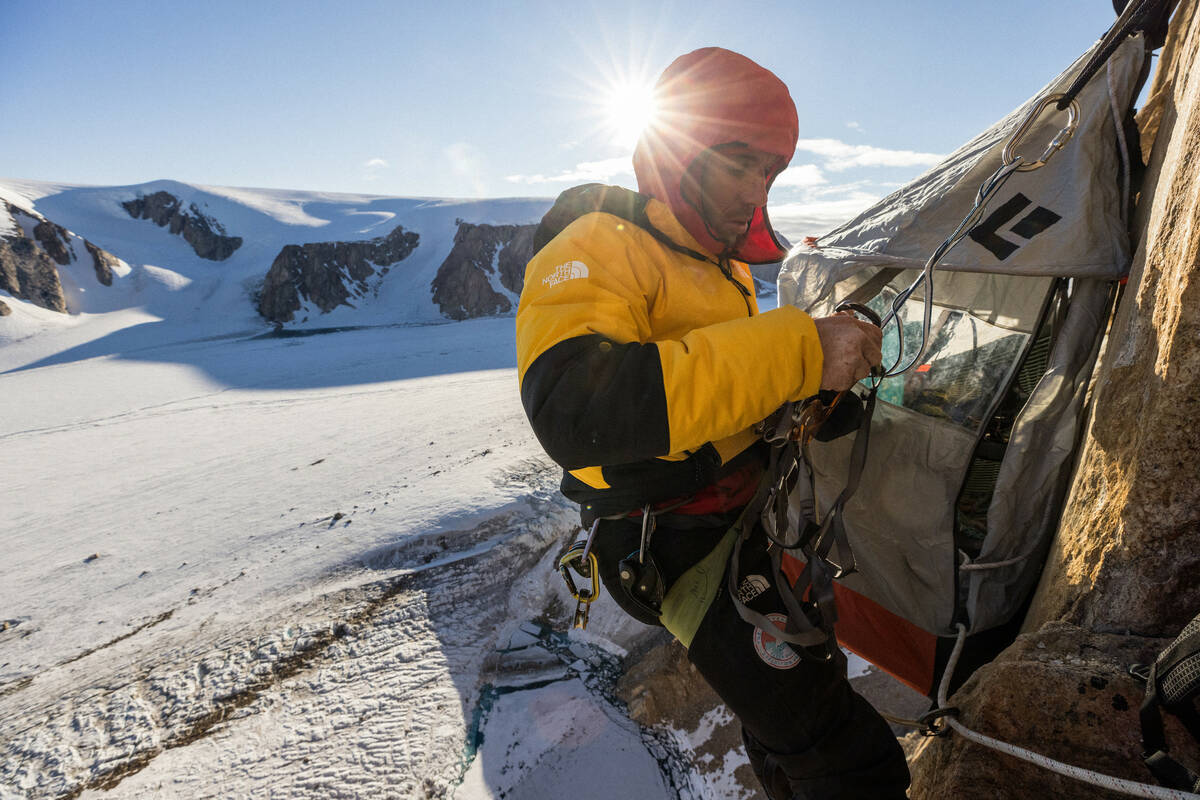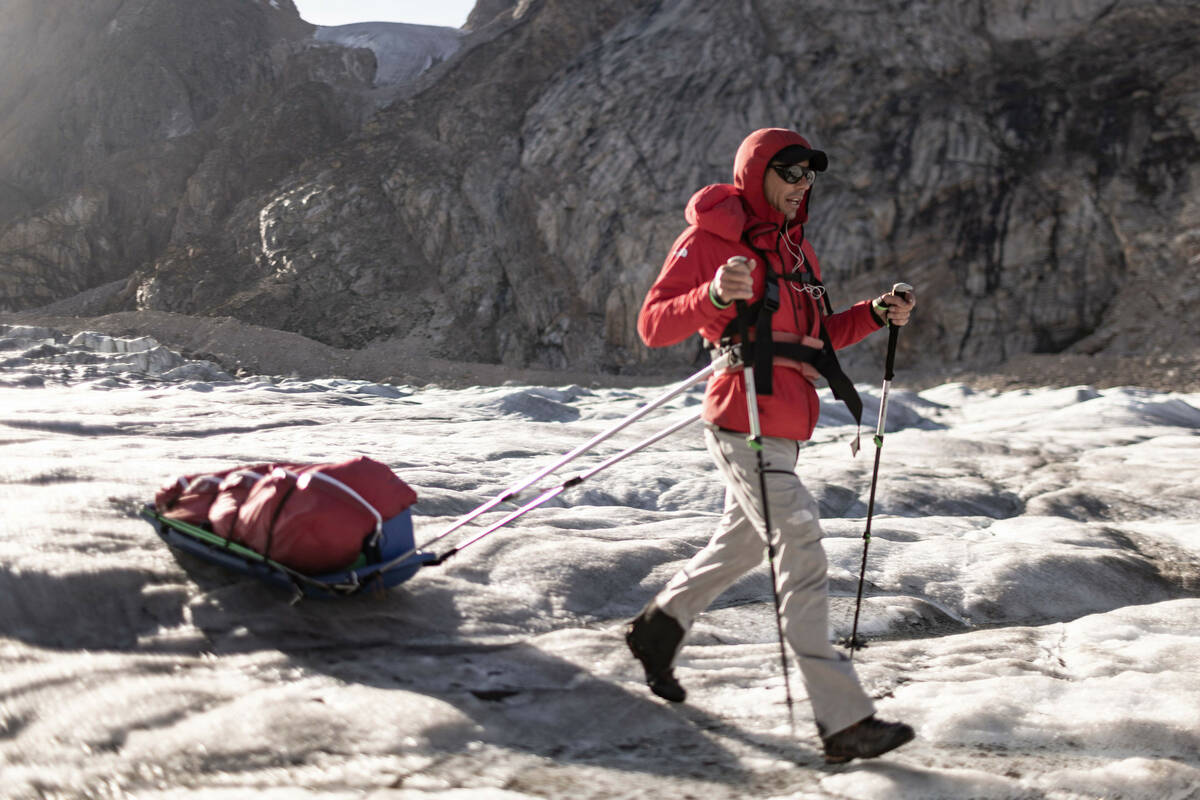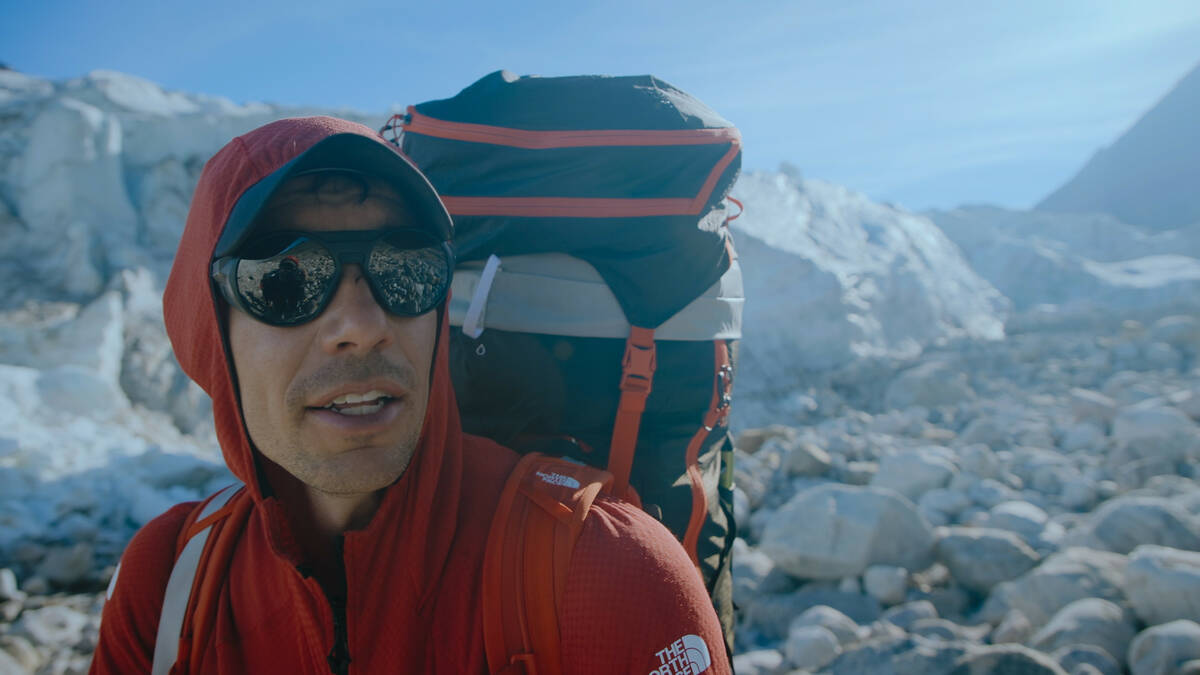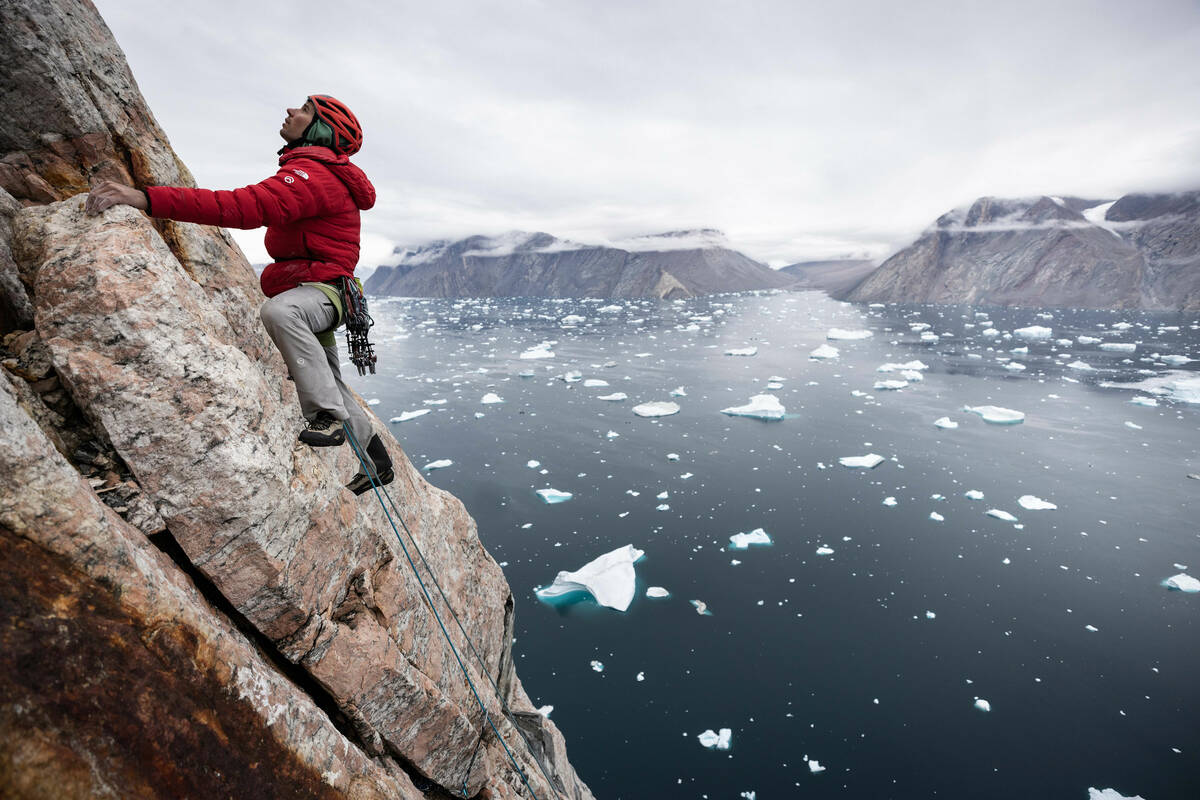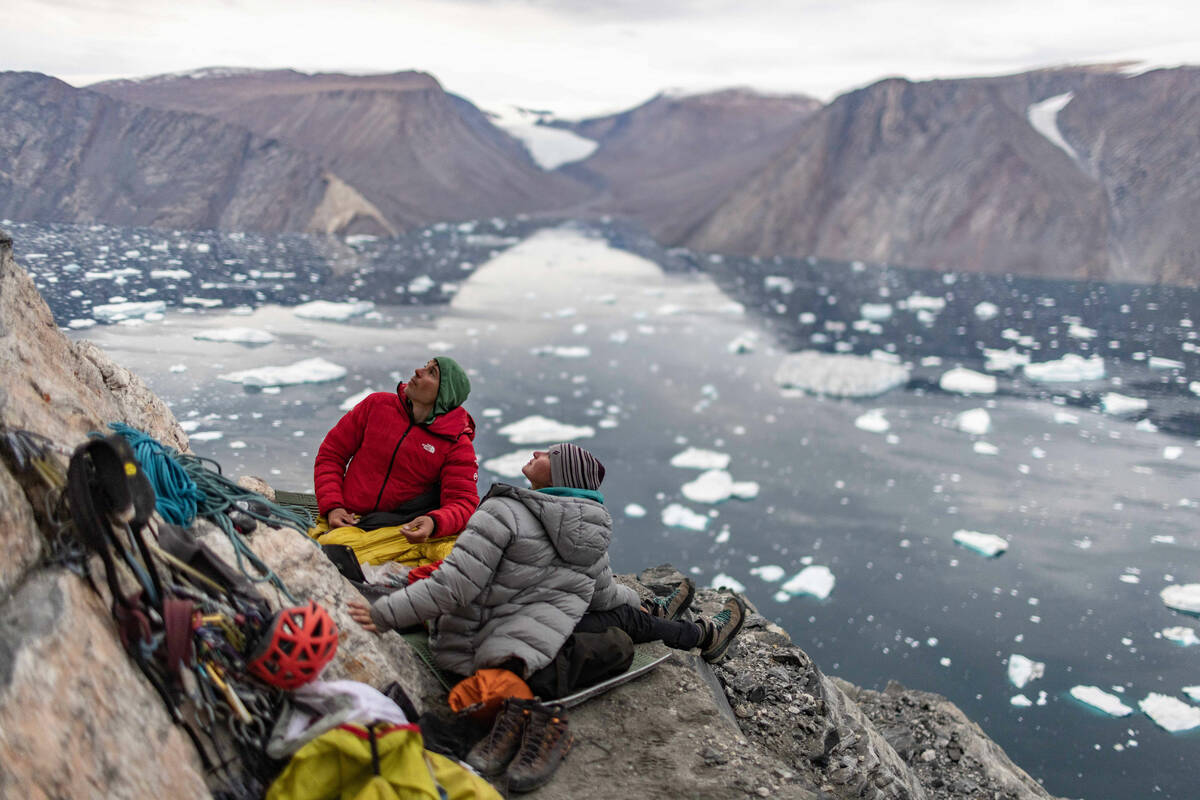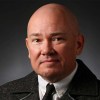Life after ‘Free Solo’: Las Vegas climber Alex Honnold is at a crossroads
Alex Honnold has grown since bursting into the public consciousness in “Free Solo.”
Not physically. The Las Vegas-based rock climber is still best described as “lean,” “wiry” and “sneaky strong.” And his hands — meat slabs that would make him an instant favorite should Dana White ever launch “Celebrity Power Slap,” also are somehow capable of folding into the tiniest of crevices, anchoring him in place on a mountain like a fleshy wedge — simply couldn’t get much bigger.
Honnold’s growth is internal, almost transformational.
On a recent afternoon in their kitchen on the outskirts of town, Sanni, his wife of three years, prepares for an outing while he hoists their nearly 2-year-old daughter, June, onto his shoulders. There are few signs of the man “Free Solo” presented as something of a curiosity — an alien presence referred to in the film by one of its co-directors as “Spock,” who seemingly was unencumbered by even the simplest of human emotions.
Some of that onscreen awkwardness, Honnold says, was because he was almost singularly focused on a trailblazing climb during the two years the filmmakers followed him. When those two years were condensed into a 97-minute film, there wasn’t room to show much of his outside life.
“I think some of it is just growing up,” Honnold, 38, says of the time since the movie was released. “It’s, what, five or six years later? I’m five or six years deeper into a healthy relationship with a wonderful woman. I’m raising kids. That’s life, you know? You grow up.”
New heights of fame
Filmmakers Elizabeth Chai Vasarhelyi and Jimmy Chin began following Honnold in the spring of 2016, hoping to capture his becoming the first person to scale El Capitan, Yosemite’s 3,000-foot granite icon, without ropes. They also wrestled with the ethics of a project that easily could have ended with its star falling to his death.
At the time, Honnold had been living in a van for nine years, projected an almost indifferent attitude toward danger and was saying things like, “I think I will always choose climbing over a lady.”
“Free Solo” follows his burgeoning relationship with Sanni, along with his journey to June 3, 2017, when he conquered El Cap in just under four hours.
The resulting film ended up with the highest-grossing per-screen opening of any documentary, being the rare feature-length documentary released in Imax, and winning the Oscar for documentary feature to go with its six Emmys.
Along the way, it catapulted Honnold from “rock climbing famous” to “mainstream famous,” even if he disputes that label.
“I think in some ways I’m in a healthy sweet spot in the middle where it’s not too crazy,” he says, now in the living room, clad in what he calls his pajamas: a top from his sponsor The North Face and sweatpants. “I can still live a normal life and do the normal things.”
His higher profile has, however, aided the Honnold Foundation. Started in 2012 to provide marginalized communities around the world with access to solar power, Honnold says it’s distributed more than $2 million in grants annually over the past few years.
Fame also has brought more “interesting life opportunities,” he says. “I got to go to Formula One when it was here in Vegas. And you’re, like, ‘Oh that’s cool.’ It’s like a fun …,” and here Honnold pauses, performing a mid-sentence fact check. “Actually, it turns out, I was, like, ‘This is kinda crazy. I don’t know if I need to do that again.’ But it’s a life experience.”
Off to Greenland
He’s climbing back into the spotlight in “Arctic Ascent With Alex Honnold” (8 p.m. Sunday, National Geographic), a three-part docuseries in which he leads an expedition deep into frozen Greenland.
In it, Sanni says Honnold seemed lost after El Capitan. Is there any truth to that?
“I mean, it’s true that the goal of free soloing El Cap was sort of an overarching dream for almost a decade,” Honnold says. “So when you achieve that, you are sort of, like, ‘OK, well, don’t have any other giant dreams on hold.’ ”
There was, however, Ingmikortilaq.
Greenland’s remote 4,000-foot sea cliff ranked as one of the tallest remaining unscaled rock faces in the world. From where Honnold and his team were dropped off, it’s a hundred-mile trek, including skiing across the 42-mile-wide Renland Ice Cap and scaling a 1,500-foot arctic cliff, just to get to the thing.
Honnold’s teammates — climbers Hazel Findlay and Mikey Schaefer, adventurer Aldo Kane and guide Adam Kjeldsen — are there so he can become the first to climb Ingmikortilaq. But there’s a dual mission: helping glaciologist Heidi Sevestre collect samples from places most scientists can’t get to as part of her research that could help predict the rate at which the region’s glaciers will melt.
“The climbing objective is amazing. But, honestly, the scientific objectives were also very inspiring,” Honnold says. “I think that the science component is the reason that it’s a TV show, because if I just wanted to go climbing, I would just find some friends and go climbing. But if you’re going to one of the most remote places on Earth that also has an outsized impact on human lives due to sea level rise, then I think it’s worth telling a story about it.”
Along the way, they faced whiteout conditions, frigid temperatures and around-the-clock daylight. Kjeldsen carried a rifle on his back and set up a fence around their camps in case of polar bear attacks.
“The bear situation there is interesting,” Honnold says, matter-of-factly. “We didn’t see any, and they’re relatively rare. But they do exist, and they are predators, and they will eat you. So you have to be sort of attuned to them. You have to be mindful.”
‘Make good decisions’
At one point in the expedition, Findlay calls out to Honnold, reminding him to “make good decisions” while he climbs now that he’s a husband and father. She says it almost teasingly, but having a wife and child, with another due any day now, has altered his approach to climbing.
“I think it’s changed the sorts of trips that I sign up to do,” Honnold says. “Or it’s changed the sort of goals that I set for myself, in that I’m trying not to be away from home quite as much. … I don’t know if being a father has changed the perception of risk that much, but it definitely has changed the way I’m willing to spend my time, which then has an effect on which risks I wind up taking.”
When Honnold left to film “Arctic Ascent” in the summer of 2022, Sanni was concerned June wouldn’t recognize him when he returned from the six-week adventure. How tough was it for him to be away for so long during such an early stage in her life?
“Honestly, at that point, our daughter was only 6 months old, and it wasn’t that hard to leave,” Honnold says, laughing. “At that point, I didn’t have that much of a relationship with her, because I couldn’t communicate with her. She couldn’t communicate. We couldn’t play together.”
When he left this past summer to spend two months bicycling to Alaska for another National Geographic project, it was more difficult, he says, because her personality had begun to shine through.
“And I think in the future it will be much harder, because now we’re like buddies, and we play, and we have a nice time every day.”
Changing the routine
Honnold has spent most of his adult life training or climbing hard for two days, taking a rest day, then repeating. His years have been structured around one climbing or expedition goal, completing it, then taking a month or two to ease back into climbing. That isn’t the case this year with a second child on the way.
Speaking with Honnold, it seems as though he may be at, or at least approaching, a crossroads.
“I’ve, like, basically sucked ever since” returning from Alaska last year, he says. “Not totally, but I just haven’t quite felt like 100 percent in a while.”
That’s given him even more time to spend with Sanni and June. He’s also had the opportunity to reflect.
“It makes you wonder if that’s because you’ve lost your fire in some way or you’re more into family time. Or is it just because you’ve finished a lot of the things that you want to do?” Honnold says. “And I think that a big part of it is that I’ve done a lot of the things I want to do, and I’m happy to play with dolls with my daughter. You know? That’s fun, too.”
TV beckons
For now, Honnold is leaning into television.
A Bear Grylls-type adventure series is a possibility. He’s been approached more than once about leading such a project.
“I did that show with him, and it was awesome. I had a great time. Super fun,” he says of the “Running Wild With Bear Grylls” episode, set in the Swiss Alps, that aired in 2020. “But we didn’t do anything dangerous. Like, the stuff that you’re seeing on television is pretty chill. It’s all rigged up by a team. There are, like, safety people. My whole experience on ‘Bear Grylls,’ I was, like, ‘This is all the stuff that I would do on a normal rest day in Europe.’ … But then, once it’s on TV, it’s, like, ‘EXTREME RAPPELLING!’ ”
More television work also would be safer, making his life easier on his loved ones.
“Anything you see on TV isn’t actually dangerous,” Honnold says. “Because if it’s on TV, it’s been insured. It’s gone through a network. Lawyers have signed off on it. People are, like, ‘Isn’t it so scary?’ And you’re, like, ‘If you’re seeing it on TV, it’s just not that scary.’ Like, imagine all the things that I do that aren’t on TV. Like, that’s the scary (expletive).”
While promoting “Arctic Ascent,” Honnold is often asked whether Sanni was worried while he was in Greenland.
“I don’t think my wife worries when I go on a TV trip. My wife worries when I go on a personal trip,” he shares. “If I’m just giving her some vague, ‘Oh, I’m just going into the mountains today, I’m just going to have a little adventure,’ she’s like ‘Uh-oh! That’s red flags!’ ”
A new goal
The past two summers working with National Geographic, which also released “Free Solo,” have established a template Honnold would like to follow.
“If I were able to do one expedition like this a year for TV,” he says, “I’d be pretty happy with that.”
Expeditions like the one in “Arctic Ascent” serve as a way for him to keep normal life in perspective.
“Because then when you come back and you’re spending time with your family, after an expedition like that, for at least the first month or two after you get home, you’re, like, ‘I’m so happy to be home. I’m so comfortable. I’m so warm,’ ” he says. “Even if the baby’s crying, you’re, like, ‘At least I’m in a bed!’
“It really makes you, like, the best version of you for a while,” Honnold says of a good expedition. “It’s nice to get a new dose every year. Just one little trip to the mountains to remind you that real life is kind of amazing.”
Contact Christopher Lawrence at clawrence@reviewjournal.com or 702-380-4567. Follow @life_onthecouch on X.



